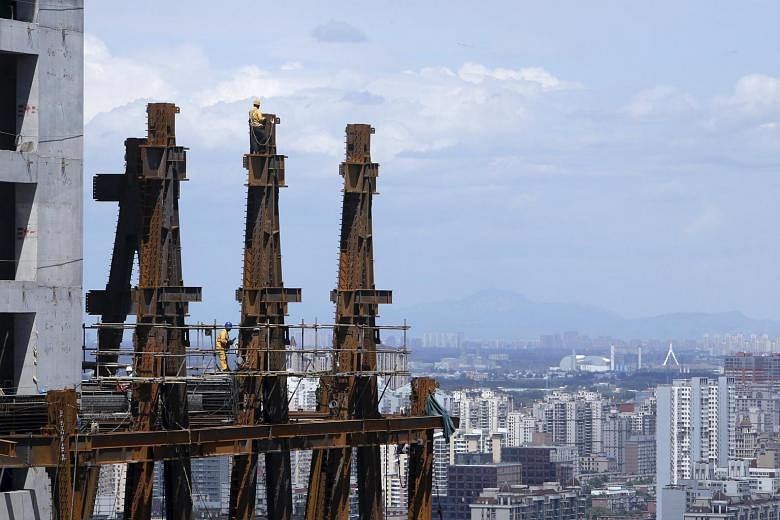HONG KONG/BEIJING (BLOOMBERG) - China is stepping up support for the economy by ramping up spending and considering new measures to boost bank lending.
The nation's chief planning agency is making more money available to local governments to fund new infrastructure projects, according to people familiar with the matter. Meanwhile, China's Cabinet has discussed lowering the minimum ratio of provisions that banks must set aside for bad loans, a move that would free up additional cash for lending.
Officials are upping their rhetoric too. Premier Li Keqiang said policymakers "still have a lot of tools in the box" to combat the slowdown in the world's No 2 economy, days after People's Bank of China governor Zhou Xiaochuan broke a long silence to talk up confidence in the nation's currency, the yuan.
"After many complaints about poor communications, Chinese officials seem to have gotten the message," Mr Win Thin, the global head of emerging-markets strategy at Brown Brothers Harriman & Co in New York, wrote in a note to clients.
And to ram the message home, the biggest economic planning agencies on Tuesday (Feb 16) promised to reduce financing costs as they rein in overcapacity. Throw in a record surge in lending in January and a picture emerges of an administration determined to put a floor under growth.
"Policymakers are battling to prevent any further slowdown, which could escalate into a hard landing," said Mr Rajiv Biswas, Asia-Pacific chief economist at IHS Global Insight in Singapore. "These additional measures will act to boost liquidity in the banking sector and increase local government spending on infrastructure development."
The nation's communist leaders are seeking to maintain economic growth of at least 6.5 per cent a year through 2020 to meet their pledge of creating a "moderately prosperous society". China's annual National People's Congress meets in March, where delegates will sign off on a new five-year economic plan.
The latest measures are a clear escalation of policy support ahead of the NPC conclave, said Mr Zhao Yang, the Hong Kong-based chief China economist at Nomura Holdings.
"We see strong headwinds in the economy, and believe that the government needs more policy support to reach their growth target for this year, which is likely to be 6.5-7 per cent," he said. "Every major central bank is easing as global economic growth weakens. China cannot tighten."
China grew by 6.8 per cent last quarter, the slowest pace since the global financial crisis. The sluggish performance came against the backdrop of a stock-market rout and a sudden devaluation in the yuan that roiled investors amid fears of further weakness.
Signs are now emerging that six interest-rate cuts by the People's Bank of China since November 2014, along with other measures to boost lending, are starting to flow through. PBOC data released on Tuesday showed that aggregate financing surged to 3.42 trillion yuan (S$722 billion) in January, compared with the median forecast of 2.2 trillion yuan in a Bloomberg survey.
Analysts cautioned that the jump in credit could be a signal the nation's state-run banks are being instructed to open up the lending spigots, even as the authorities promise to rein in the nation's growing debt pile.
"Short-term prospects look brighter, but runaway loan growth will do nothing to ease concerns about China's over- extended banks and over-indebted corporates," Bloomberg Intelligence economists Tom Orlik and Fielding Chen wrote in a note.
In a more positive sign, companies are paying down their foreign debt. Over the past six months, corporates have shaved their dollar borrowings to US$820 billion (S$1.15 trillion) from US$940 billion in July. Cutting back on US dollar exposure brings down borrowing costs for companies in the real estate, energy and banking sectors especially, and removes risks should the yuan continue to weaken.
Instead, corporate borrowers have been turning to the domestic bond market for financing. The nation's firms sold 454.7 billion yuan of notes in January, 2.5 times the amount sold in the same month last year, as the yield on top-rated 10-year corporate notes dropped to a decade low. By contrast, they issued US$6.8 billion of dollar-denominated bonds so far this year, a decline of 42.9 per cent from the same period last year, according to Bloomberg-compiled data.
"Increased domestic corporate-bond issuance suggests corporate credit demand is there, but whether it's for cash-flow purposes or actual real economic value-added activity remains to be seen," said Ms Donna Kwok, senior China economist at UBS Group.
Under the plan to juice infrastructure spending, the National Development and Reform Commission plans to offer 400 billion yuan this quarter under a special bond programme so the local authorities can finance infrastructure, people familiar with the matter said.
Making 400 billion yuan available in each of the next three quarters would mark a doubling in the pace of funding under the bond programme. Economic planners offered 800 billion yuan in bonds last year. The NDRC unveiled the special bond programme last year as part of efforts to boost spending.
For banks, the highest level of soured loans in a decade has hurt profits and cut their bad-loan coverage ratios close to the regulatory minimum. That's prompted lenders including Industrial & Commercial Bank of China Ltd to urge regulators to ease the provisions requirement for bad loans, which would give banks more scope to lend and bolster an economy that grew last year at the slowest pace in a quarter century.
"Policymakers seem to be determined to make the economy grow above their bottom line of 6.5 per cent," said Mr Larry Hu, head of China economics at Macquarie Securities Ltd. in Hong Kong.
"Although many fear the prospect of a hard landing in China this year, the big picture is that China will have another power transition in 2017. Before that, top leaders would try their best to maintain a relatively stable environment."

